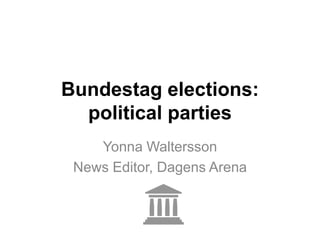
German political parties
- 1. Bundestag elections: political parties Yonna Waltersson News Editor, Dagens Arena
- 2. Political Parties Not likely to enter Likely to enter
- 3. CDU • Founded in 1945 • The major catch-all party of the centre- right. • Along with Christian Social Union of Bavaria (CSU) the CDU forms the CDU/CSU grouping in the Bundestag. • Angela Merkel more popular than her party. • This is something the CDU earns from as the elction campaign will be shaped by personality issue. • 2009: 27,3 % • Polling at: 37 % Angela Merkel
- 4. Sozialdemokratische Partei • Was established as marxist party in 1875. Re- established as socialist party after World War II. • Second major party in German politics. • Peer Steinbrück lead the party in the election. • Government programme for the election aims at providing greater solidarity and social justice. • Key element of the strategy against poverty is a general minimum wage of € 8.50 per hour. • Steinbrücks personal approval ratings are far behind Angela Merkel. • 2009: 23 % • Polling at: 27 % Sigmar Gabriel
- 5. Freie Demokratische Partei • Founded in 1948. • Part of 14 out of 20 coalition governments since 1949. • Pro-business party that promotes free market economics and individual liberty. • Has suffered from regional election defeats and internal conflict. • Used to be the kingmaker party – this role now taken by the Green Party. • Often get support votes from CDU voters. • Are attacking proposals for minimum wage • 2009: 14,6 % • Polling at: 5 % Philipp Rösler
- 6. Bundnis 90/Die Grünen • The Green party was formed 1980, entered Budestag 1983. United with Bundnis 90 in 1993. • Appeals to higher income households in urban areas. • Early on: anti-establishment, eco-libertarian and post-materialist agenda. Now a broadened programmatic stance. • Has earned votes from FDP setbacks. • Likely kingmaker party: included in three out of four possible government coalitions. • Greens benefited from the FDP’s transformation into a more neo-liberal party • Katrin Göring-Eckardt and Jürgen Trittin are the top candidates in the election campaign. • 2009: 10,7 % • Polling at: 15 % Claudia Roth/Cem Özdemir
- 7. Die Linke • Founded in 2007. Merger from post- communist Party of Democratic Socialism (PSD) a left-wing breakaway from the SPD. • Strong in Eastern parts of Germany, loosing ground in the West • Appeals to older voters • Overshadowed by the other small parties • Are attacking low-wage sector, ”mini jobs” • Not likely as a government partner • 2009: 11,9 % • Polling at: 7 % Katja Kipping/Bernd Riexinger
- 8. Piratenpartei Deutschland • Founded in 2006 • Internet freedom and more accessible politics • Appealed to young people • Has entered four state parliaments • Failed to manage their political victories • Internal fights • Online bullying instead of public debates • So small they do not show in several polls • In need of a miracle • 2009: 2 % • Polling at: -- % Bernd Schlömer
- 9. Alternative Für Deutschland • Founded in april 2013 • Single-issue party: Anti euro/pro EU • Technocratic revolt • Sees the euro as a doomed project • Polls show that 17 percent of voters could imagine voting for them • Puts pressure on CDU • Not likely to enter the Bundestag • 2009: -- % • Polling at: 3 % Konrad Adam/Frauke Petri/Bernd Lucke
